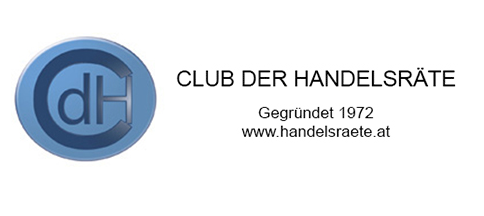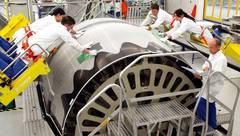Miba & FACC
The trade delegates' excursion day tour in October led to two industrial companies with production plants in Upper Austria: Miba AG and FACC AG.
With a total of 27 plants in Europe, Asia and America, Miba AG is one of the leading strategic partners of the international engine and industrial bearings. The company's product portfolio includes sintered components, engine bearings, friction materials, power electronic components, special machine constructions and coatings. Since 2010 Miba has created around 4,300 new jobs worldwide, and the growth continues. Nowadays about 7.400 employees are working for Miba worldwide, generating 88 Mio Euro revenue in 2017/2018, and an R&D ratio of 4,5 %.
The visit started with a warm welcome by F. Peter Mitterbauer, CEO Miba AG with a presentation of the Miba Group at Miba Forum. The name says it all, Bernhard Reisner, Vice President Human Capital, Miba AG, explained: "The Forum is a location for meetings and dialogue, where Miba's employees can better develop their creative potential overcoming outdated hierarchical spatial concepts and focusing on what really counts: designing Miba?s future in an open-minded, solution-oriented way."
Actually Miba investments amounted to EUR 40 million to research & development in fiscal year 2017?2018. The research ratio at Miba has traditionally been high, amounting to 4.5 percent in the past fiscal year. "We want to continue to invest heavily in Miba's future," confirmed F. Peter Mitterbauer on the Group's planned growth: "Miba's solid equity base, with an equity ratio of 54,3 percent, provides the ideal prerequisites for continuing to freely and independently invest in Miba's future and to grow."
Recently Miba acquired the industrial bearing segment of the John Crane Group. Now the company is entering another new line of business: the development and production of industrial bearings. The industrial bearing segment of the John Crane Group produces hydrodynamic bearings for use in mechanical and plant engineering. The bearings are primarily used by customers in the energy and plant engineering industries, in high-performance applications such as turbines, compressors and industrial pumps. They are used in applications in the power generation, oil & gas and chemical industries.
After this introduction Lukas Hädicke, Head of Application Engineering, gave the trade delegates an enthusiastic impression of Miba's production site in Laakrichen, showing the smallest as well as the biggest bearings being produced there and gave some insights in the sophisticated process of mixing metals.
The trade delegates would have loved to stay longer at this highly interesting facility, but they had to head towards the next impressive company and its production site, FACC, headquartered in Ried im Innkreis.
FACC is a global aerospace leader when it comes to designing, developing and manufacturing advanced aircraft components and systems. As a technology partner of all major aircraft and engine manufacturers, FACC collaborates closely with our customers in order to devise solutions for the mobility of tomorrow. All over the world, an aircraft with FACC technology on board takes off every second.
In 2017-2018, FACC generated annual sales amounting 751 Mio Euro annual turnover. About 3,400 employees are working at 13 international sites. The company is listed on the Vienna Stock Exchange ATX and part of the Fortune 500 AVIC Group.
Experts from more than 38 countries are working at FACC manufacturing and engineering sites all over the world, producing composite lightweight components for primary and secondary structures as well as cabin interiors. Since the company was founded in the 1980s, FACC has been working with fiber composite future material. Initially in other industries, FACC became one of the global leaders in the field of lightweight aerospace components.
With its five plants and production facilities covering a total of 100,000 square meters, Austria is the hub of FACC's operations. The five Austrian facilities are in close proximity to each other, making for added flexibility and logistical advantages.
Jeroen Wijnbergen gave the trade delegates the opportunity to look behind the scenes by a guided factory tour at "plant 4" in Reichersberg. At a total floor space of 26,500 m² FACC builds translating sleeves for the Airbus A350 and Boeing?s 787 hand-laid in large clean rooms. Engine parts in Plant 4 are cured in two massive autoclaves, with a diameter and depth to accommodate several wheeled carts with tools stacked two high.
Final non-destructive testing by ultrasound checks the products before leaving the factory.
And the trade delegates left the plant with an abundance of experiences and impressions.





